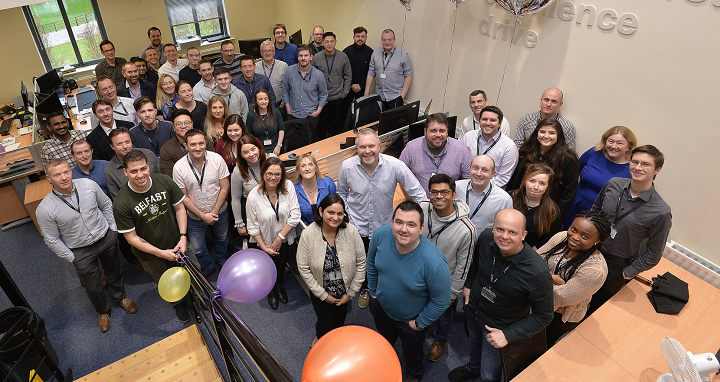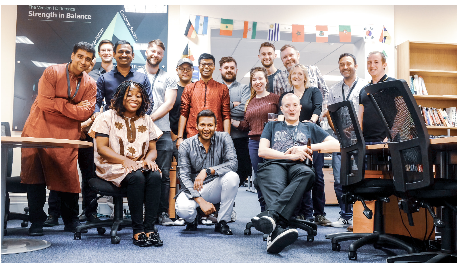
Diversity and inclusion roles are now highlighted more than ever, due to the Covid-19 crisis changing work and social justice movements like Black Lives Matter gaining global awareness.
At this pivotal time in society, tech firm Version 1 has recently affiliated with not-for-profit Diversity Mark NI.
Sync NI spoke to Version 1’s Belfast-based diversity and inclusion team co-lead, Honey-Bell Oke, who said the collaboration’s aim is “to understand what we are doing right but to also look at ways in which we could do better”.
She added: “We have different people from different backgrounds but it’s also about belonging, as well as diversity and inclusion.
“With Version 1 we want to target the people that are already employed – do they feel like they belong? Or are we just ticking boxes?”
RELATED: What exactly is the problem with the lack of women in tech?
Author on race, Pragya Agarwal has referred to such box-ticking firms before, maintaining that they see diversity roles as being “nice to have” rather than an imperative need.
Honey-Bell affirmed that as a black, Nigerian woman in the Version 1 Belfast office, her company sees diversity and belonging as much more than this.
An example she gave is that she does not consume alcohol. She said: “I can easily tell you that if I go out – anyone within my workplace would know what to order for me because they know that I don’t drink alcohol” and exclaimed that “tiny things like that go a long way!”

The Senior test analyst continued: “It’s a family environment. I am the only black person in the Belfast office, but I never feel any different.
“I was part of a panel event for Amplifying Black Voices in Northern Ireland by Women Techmakers and Version 1 was one of the sponsors.
“The support I got was amazing. Version 1 sent out books to winners that educated people about race.”
Sync NI asked Honey-Bell why she thinks diversity and inclusion roles within corporations are vital, considering that some global firms may get rid of such jobs due to financial cutbacks caused by the Covid pandemic.
She said: “Without the employees, you can’t have a company and if they don’t feel as if they belong or if they feel they are being treated unfairly - the way I look at it, diversity and inclusion covers every single aspect of your work life. It covers your health and wellbeing, HR, and so many other things that most people don’t often realise.
“It is the oil that keeps the company engine running. If I have someone who is like me – qualified for a particular role – and I’m happy where I work, I will encourage those people to join. Companies wouldn’t need to pay a lot of money for recruitment agencies when the word of mouth amongst diverse employees is spread.
“I’m black and African, and so I have more black and African people in my social circle. If you have people from India and Brazil - for example as we have in Version 1 Northern Ireland - they have likewise people in their circles.
“If we increase this diversity in circles, we can help onboard more diverse people with different skills set that otherwise wouldn’t have known about the company.
RELATED: Why is diversity in people and talents needed in tech?
“I believe my company would take care of you. So now you get people who are not just qualified, but with different characteristics, backgrounds and experiences that want to work for your company.
“Only when you know someone personally can you know what their personal qualities are like, which cannot be shown on a CV, and you know if they will be a good fit with your company for those reasons also.”
Version 1 hosts popular diversity events such as culture nights, whereby colleagues get to showcase and share different aspect of their unique heritages, such as foods and facts. 
Culture nights at Version 1 prove to be very popular, Honey-Bell said
Honey-Bell noted in “that way, we spread news and help reduce racism and xenophobia. It’s all about education. If you don’t know things, you become ignorant, but information from someone from a particular country is far more priceless than what you can find on the internet.
“The world is changing, and companies don’t want to wait until something happens to trigger a decision. Decisions need to be made now. So many companies were called out when Black Lives Matter became global because they were seen to jump on the bandwagon of saying they cared about equality.
RELATED: Tech Craic: Deepa Mann-Kler - Race and diversity in tech and NI
“To have a diversity and inclusion team already in place and to keep it well funded would allow firms to have these equality checks and balances already in place, and these reps can ask these questions that the directors might not have thought about. For example, “are women being promoted enough within this firm? Do they have their voices heard?”
On that note, another aspect of Honey-Bell’s team is the Version 1 NI Women in Tech group which was set up to help empower and encourage ladies within and outside the company.

Honey-Bell commented: “We have had various internal meet-ups where we try to create a free space for ladies to share and learn. I would like to mention our Care, Share and Inspire initiative which we had during this year’s International Women’s Day.
“We had girls from secondary schools visit the office and we arranged for some of the ladies in the office from different roles to share with them how they got into IT.
“We had very encouraging feedback from the girls as some of them had the mindset that IT is all about coding. This broadened their mindsets as to what they would like to become in the future.”
Research also shows financial advantages in diversity, with greater revenues generated from diverse teams’ innovations and LinkedIn data has recently shown that diversity roles such as Honey-Bell’s have increased in the past five years, rising 58% in the UK with many at senior level.